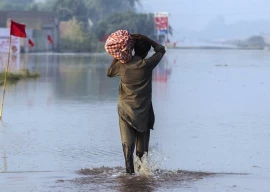
The movement for linguistic purification — which I call the ‘Islamisation of Urdu’ for reasons given below — started in the middle of the 18th century. The ancestor of Urdu was an Indic-oriented language. By this I mean that it had words of the local languages (bhaka or bhasha) and Sanskrit, and its allusions were to India and the local culture. Even though the script of some writings in this language is Perso-Arabic (Urdu), as opposed to Devanagari used in the Rajput writings, the language is similar. This common language underwent a great change from the 1750s onwards which is the theme of this article.
In this purification movement, the Indic element was purged out by Muslim poets who, it appears, wanted a class-identity marker. Among the changes which occurred were: the removal of local (bhaka) and Sanskritic words, the substitution of Iranian and Islamic cultural allusions and metaphors in place of Indian and Hindu ones, and the replacement of the Indian conventions about the expression of love (woman to man) by Persian ones (man to woman or adolescent boy). Among the more than 4,000 words purged out were nain (eye), prem (love), mohan (dear one) etc. They do exist in songs and some other forms of poetry, of course, but they were banished from the ghazal. The grounds given in the writings of the poets who did all this — such as Shah Hatim (1699-1786), Imam Baksh Nasikh (d. 1838), Insha Ullah Khan Insha (1752-1818), etc — are not communal. They said that certain words are obsolete, unfashionable and rough. However, the end result was that words of Indic origin were the ones which were purged. That is one reason why I call this movement ‘Islamisation’. To take one concrete example, Hatim made a small extract of his voluminous poetic work calling it Divan Zada (1756). In the preface of this compilation, he writes in Persian that he “had stopped using the local idiom which was called ‘bhaka’” (bhaka goend mauquf karda). In its place, he tells us, he had started the refined idiom of the gentlemen of Delhi. And what was this? For an answer we have to go to Insha who defined it precisely in his Persian book Darya-e-Latafat (1802). For Insha, this was the language of the Muslim elite of Delhi and Lucknow. Such notions about linguistic excellence were in circulation from the 14th century at least, as Amir Khusro’s own notions illustrate. However, during the 1750s the ideas of Sirajuddin Ali Khan Arzu (1687-1756), a Persian poet and linguist, had a stronger impact on Hatim and the other reformers. Arzu corrected an existing dictionary naming it Navadir-ul- Alfaz (1751). In this he indicates at several places that the standard language he had in mind was that of the elite of Delhi. And this idiom was far more Persianised and full of Islamic cultural references than the other styles of the language spoken elsewhere. So it was this Persianised language which became a marker of the educated, mostly Muslim but also Hindu Kaesth, identity during British India.
The impact of this movement was that it changed the identity of the common language of north India to two languages: Persianised Urdu and Sanskritised Hindi. The process of Sanskritisation started from 1802 onwards and it was a consequence of political awareness, incipient nationalism and reaction to Muslim cultural dominance. But this dominance had been contributed to; by the same movement of the Islamisation of Urdu so that a Hindu poet had to use Islamic phraseology in order to be appreciated. And yet, ironically and most unjustly, Azad’s book Ab-e-Hayat ignores both Hindu poets as well as women. There is no doubt that this process of Persianisation was a class movement meant to strike out an independent path rather than to write in Persian itself as the Iranians made fun of Indian-Persian. Moreover, from the 1830s onwards, Persian was being phased out from the domains of power. Both the Muslims and Kaesth Munshis were interested in using Persianised Urdu to retain their monopoly over jobs in UP and the Punjab. But the apprenticeship (ustadi-shagirdi) tradition, the poetry recitation sessions (mushairas) which were assemblies of rivals and the cultural capital given to language was such that the allusions, references and the atmosphere, at least in the ghazal, was Persian and Muslim. That is why the movement alienated Hindus and that is why I call it the Islamisation of Urdu. Its greatest harm was that it began the division of Urdu-Hindi into Urdu and Hindi and this was continued by the Sankritisation of Hindi later. And yet, the spoken language of ordinary people remains undivided. It is only by recognising this history and resolving to build upon common themes and continuities of this common language of north Indian cities that we exorcise the ghosts of the past from this subcontinent.
(For those who want details please refer to chapter five of my book, entitled From Hindi to Urdu: A Social and Political History (OUP 2011).
Published in The Express Tribune, August 21st, 2011.
COMMENTS (34)
Comments are moderated and generally will be posted if they are on-topic and not abusive.
For more information, please see our Comments FAQ




1725967717-0/Untitled-design-(3)1725967717-0-165x106.webp)








Interesting read, i personally had very little clue on this transition and transformation of Urdu.
It just surprises me though, why do contributors here don't feel the need to answer/respond to comments. I think this would help in building conversations and provide opportunities for every visitor to learn beyond that particular aspect the writer originally has in mind.
For example i didn't know India had 22 Scheduled Languages, honestly had no idea if there is actually anything such as Scheduled languages.
Good read nonetheless.
@tanoli: Till 1947, Gandhi was in favor of implementing Hindustani (non polarized language spoken in north india by both muslims and hindus) with devnagri and arabic scripts both
Just as French and Latin, being the language of elite and church got into English, Persian and Arabic words got into Urdu as they were the languages of ruling elite of India then, nothing more ,nothing less.The then poets have made a living by pleasing the elite by using words familiar to them. Looking these historical issues have nothing to do with religion of Islam.
Urdu is still much revered language among a wide cross section of Indian diaspora, a fact that doesn't get media attention.
The article is brilliant and very educational. Using words from the land we conquered would make us Islam-lite. The strains of being special and unique existed well before 1947. Why are we surprised then with the intolerance for "others" in our society.
waise, Hindi was given the status of official language because of it's wide reach. According to the language census of 1991, more than 40% of Indians claimed Hindi as their mother tongue and the figure of those who knew Hindi was around 49%. In past twenty years it must have grown to something around 60%. And in case of any dispute English prevails over Hindi
@Indian yes, I am from Bihar and my mother tongue is Vajjika( a dialect of Hindi). I know these things because I am a student of history and political science and I read these things in my text book
better read the eighth schedule of constitution
@Vaibhav: They are called "scheduled" languages because they are included in a schedule of the Constitution. I did not know that some states have more than one language officially recognized. Linguistic reorganization of states took place obviously on the basis of one language-one state. Interestingly, people were apprehensive about that reorganization as they feared balkanization of India just as Pakistanis fear it would happen to their country if more states were created.. Is Bodo recognized in the Constitution, yet? Thanks for the information!
@Anybody - What is the origin of the word "Endhan" ( fuel ) ?
Urdu has a vestigial remnance in modern India. Consider the opening bill for 'Hindi' movies. It has a Hindi, English and Urdu transliteration of the movies name. Why is Urdu there at all? Because almost everyone, whether Hindu or Muslim, can easily read the title in Hindi and/or English, the presence of Urdu is redundant. Right? Wrong! Urdu is there for two reasons. One historic, the other political. Post 1947, the shock of partition, and the pro-secular stance taken by the Muslims choosing to stay in India, and their strong presence in the film industry, gave Urdu a very strong position and projection. India as a whole and Indian Muslims in particularly felt a need to reaffirm their territoriality and allegiance. The result was the stress on inclusion of the Indian Muslims in the Indian mainstream. That Urdu was the MOST VISIBLE and SECULAR, symbol of the Indian Muslims in the cultural schema, made it convenient. However, as Hindi was made an official language, Urdu's usage suffered. It was increasingly seen as an impractical language, ill suited for advancing in a career. . So why is Urdu still used in those Bollywood titles? Because secularism in India has warranted its continuation. Also, over the past two decades, with the BIP diaspora, (Bangladesh, India, Pakistan) and access to entertainment, has only increased the needs for cultural shorthands and inclusion. Urdu still fits the bill adequately. . Lastly, Urdu has had champions in the revival of Ghazal in India by various singer and poets. Also, Qayamat Se Qayamat Tak, Aamir Khan's first big hit, was explicitly certified as an URDU production. These strains prove that the music if Urdu is still alive in India. Though it exists more as a solo instrument, than a symphony.
@Vaibhav You must be a south Indian or a broad minded North Indian.
Many Hindi speaking North Indians don't know the Indian constituition and claim Hindi is the national language of India. If Hindi is the national language, are Marati, Telugu, Gujarati, Assamese, Tamil foreign languages?
You can have national flower or national animal. You cannot claim one language is the "national language" when the "nation" speaks multiple languages.
You are correct, due to domination of Hindi speakers, Hindi was accorded "official language" status. However, English is also an equal official language of India.
nI am from the south but learnt Hindi and Sanskrit on my own. I have encountered linguistic chauvinism from Hindi speakers. I pity them.
Mera Bharat Mahan :-)
@ din. No, not true. They are scheduled languages not national. Big difference. Some states have more than one language listed as scheduled languages. For example, Assam( assamese and Bodo)
@Vaibhav: to mindcontrol "no language in India is given the status of national language " All 22 languages listed in the Constitution are called "national" languages and appear on currency notes. Hindi and English are the "official" languages i.e used for official purposes, at the federal level. After linguistic reorganization of India, each state got its own official language as well. Not all the languages have a script of their own, for instance Kashmiri. Such language(s) are not even used in the state they are associated with for any purpose.
@Majid:
"Languages are basically a means of communication, expression of emotion, attitude and mood. But they are also associated with identity in various degrees. Identity is nationalistic, sub-nationalistic (ethnic) and, in some rare cases, also religious". Says it all.
Cause of every misery in the past, present and if we don't change, will continue into the future.
"Raj Arjun ki baghal mein baytha hai" has such funny undertones in Urdu yet it's supposed to imply something completly different in Hindu. How can this be the same language?
I would say this was good research, however you fail to mention how the transition from old Urdu took place in prose. After all, the common man didn't learn how to speak Urdu the way it was spoken in more modern times by reading elitist ghazals and poetry.
They did it by reading, conversing and communicating in their everyday lives in that prose. That is why modern Urdu is spoken and well-understood in all parts of Pakistan even the hardcore Southern Punjabi and Pushto belt, who are perhaps the most resistant to cultural domination led by Urdu.
You do make some concrete points about how the roots of modern Urdu's transition lie in poetry but I feel you've only scratched the tip of the ice berg. Surely there is far more to it than just a few poets trying to 'hijack' - as you say - an almost medieval language.
On the point of this being the same language continued to be spoken among the masses, I differ. Today a Pakistani speaking Urdu and an Indian speaking Hindi has hardly 30-40% similarity.
I, as a Pakistani, can't help cringing on the use of 'Ki' instead of 'Keh' when I see an Indian speak. The only explanation I give myself is that he speaks a different language.
In the science of Psychology, no human behaviour is abnormal as long as there is no fixation of behaviour. Fixation of behaviour emerges, when the very thought to deviate from a certain mode of thinking or habit leads to a mental impotence. Such is the case of this mentally retarded author and all these Islamic fanatics, who are no more then blinkered specialists suffering from a chronic fixation of Islam. I have never heard of such nonsense debates of religious or cultural leg-pull in Europe from Professors or the people, where languages and human minds have evolved in centuries. If Greek and Latin is subtracted from the English language then what shall be left in the dictionary? As Ghalib sahib said, Urdu is the language of Hindustanis and FULLSTOP!............................................................... nd Latin roots in English - Wikipedia, the free
@Vaibhav
Thanks for the correction bro. Actually I just went by the number of languages on a Hundred Rupee note. Shows you can't afford to be lazy on a forum like this.Thanks again.
@mind control little correction: India has 22 scheduled languages with Hindi and English as it's official languages. Unlike Pakistan, no language in India is given the status of national language
@Tanoli
gandhi and jinnah could not agreed on one language for india ghandi want to call em hindi and jinnah want it urdu.
Forget about Gandhi and Jinnah not agreeing. Jinnah and East Pakistan could not agree on the language. And finally East Pakistan went its own way with Bangla as the major language.
Now, coming to Gandhi and 'one laguage for india', suffice it to say that India has 17 'official languages' including Urdu and English.
P.S. I hope you know that it is not obligatory to post a comment if you are visiting this forum.
Hey guys, Hindustani is not same as Urdu. It's a mix of Hindi and Urdu. Like- "Aatankwad ka saamna ham apni fauladi jigar se karenge" Aatankwad= Dehshatgardi
Extremists always try to give colour of religion to every thing. This also happened with Urdu language which had become equally popular amongst all Indians from all religions. Declaring Urdu as the language of Muslims by Muslims themselves, harmed it extremely though still it is spoken every-where in India and also adopted by media and their films. But what has happened in Pakistan; since beginning it has been remained practically more disputed language than in India.
@Domlurian:
You must be kidding, Pakistan's future is with the Middle East? As a Pakistani, I find nothing in common with Arabs except my religion. Our cultures are nothing alike, and to be very honest, ours is much richer history (except maybe Egypt's). I don't like most Arabs either.
@chu: I do not think that the author is taking any sides. This article is a scholarly undertaking meant to understand the history and evolution of two major Sub-continental languages.
Thank you for the enlightening article and making me aware of our linguistic history of which I was wholly ignorant of.
@bruteforce...
Spot on... No body celebrates diversity like we do...
Tanoli, Gandhi preferred Hindustani (the same as Urdu) over Hindi as the national language of India as that was to him the comman man's language. Jinnah wanted Urdu as that was the language of the landed elites in north India who were the backbone of the Pakistani movement
@tanoli:
Gandhi wan not foolish enough to not recognize that India had umpteen languages in her kitty. That is why India recognizes about 18+ languages as national languages. In India being different is good. That is why India has survived in its present form for so many decades and Pakistan has not.
Good detaile on urdu hindi thank you Dr tariq rehman and may be this is was the reason in gandhi and jinnah could not agreed on one language for india ghandi want to call em hindi and jinnah want it urdu.
By Sanskritization you mean reversal of islamization - right?
hi doctor/professor- why this fascinatin with islam/muslim all the time. agreed that you are the biggest muslim nation on earth, one of the bestest and purest religion in the world- but cant you find any other topic for a change? who are you trying to impress-yourself?